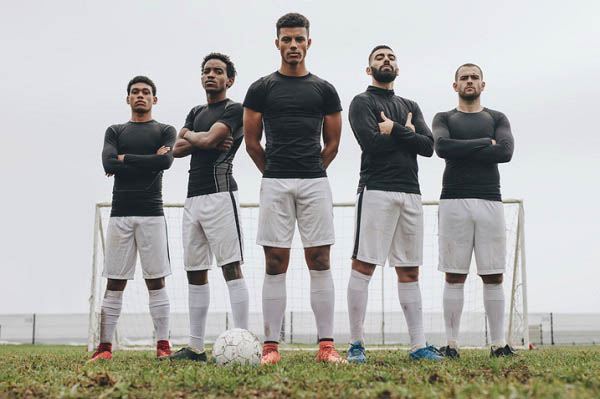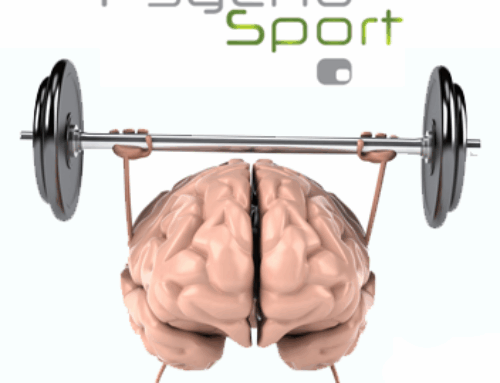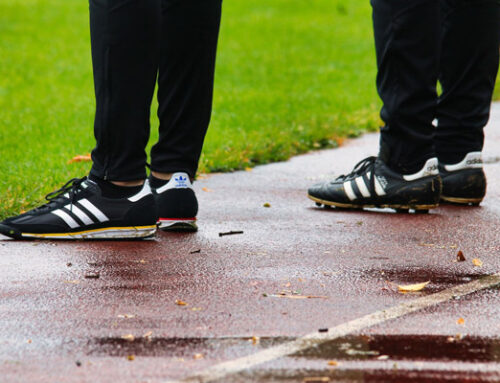In football, technique, speed, tactics, teamwork, and game sense are essential parameters that require considerable preparation work.
But what about mental aspects in football and their preparation?
How can mental preparation in football make a difference on the field, as well as off it?
The Importance of Mental Preparation in Football
The mental aspect allows for the expression of a player’s true abilities on the field.
A confident football player performs better, takes risks, easily showcases their potential, and reaches their level of play during training.
Conversely, a player who is too tense for various reasons or lacks confidence tends to hold back their movements, take fewer risks, be less decisive, lose their duels, etc.
A football team with a positive group dynamic will also perform better.
Football requires a solid and consistent mental attitude, which is an essential factor for performance.
In this article, we will analyze various individual and collective aspects and present some approaches and techniques of mental preparation in football.
Mental Preparation in Football: What Is It For?
The mental preparer in football is primarily there to help the football player feel comfortable on the field, with a sense of being in their element.
As we know, pleasure is the primary key to success!
By allowing the body to release dopamine in the brain and deploy itself appropriately to allow technique to shine, without being hindered by muscle contractions, pleasure becomes a source of motivation and expression of potential.
Mental Preparation of Football Players
Initially, the football mental preparer will work on developing players’ mental skills.
They will highlight, with the player, their strengths and weaknesses in terms of mental aspects (assessment).
Mental Preparation Techniques in Football
The mental coaching techniques used in football by the football mental preparer are numerous.
Here is a non-exhaustive list:
Positive Mental Visualisation (Imagery)
Being able to visualise successful technical and tactical plays, as well as positive attitudes on the field, will enhance performance.
Visualisation enables the activation of performance automatisms that are recorded in memory.
In fact, the brain doesn’t differentiate between an imagined gesture and a real one.
Before a match, it prepares the body to respond correctly.
The most successful players have higher levels of positive visualisation abilities compared to others.
These skills are also useful during injury periods.
Injured, while watching the matches, I would imagine how to counter this or that forward, what pass to make.
I learned that progress is possible even without being able to train.
Self-Confidence in Football
The feeling of self-confidence gives the green light to the body to express its full potential.
It’s essential to train self-confidence during mental preparation sessions to tap into all of one’s technical and physical abilities.
When confident, players claim to dare much more on the field and become more effective.
Stress Management
We know that a dose of stress, or physiological activation, is necessary for the player to energize themselves (positive stress), but if this dose is too high, it causes muscle contractions that hinder playing properly and deteriorate technique.
In football, this type of situation particularly occurs during penalty shootouts or simply when a player – or sometimes the team – completely loses their match due to pressure.
Quality mental preparation allows for better overall stress management and specific situations.
I perform better when I’m mentally relaxed, my game is fluid, I have a feel for the game and I almost do what I want.
Focus on the Action
Obviously, one must stay focused on the crucial elements to play properly: the ball, teammates, opponents, and the course of actions that need to be anticipated as well.
Simple? Not really.
It’s not uncommon for a player to drift away from the present moment and direct their attention, for example, to the referee, the previous phase, or a player who irritates them. This serves no purpose other than to take them out of the match.
Learning to concentrate their attention on the flow of the game throughout the match requires mental abilities that are useful to train.
Optimal Performance (the “Flow”)
Training these mental skills enhances the optimal performance of players, meaning the ability to express all the technical-tactical and physical potential they are capable of when approaching the optimal conditions for their performance, where the mental aspect is predominant.
> See article: Flow in sport.
Managing Injury Periods and Training through Mental Imagery (Visualisations)
Injury periods sometimes result in inactivity and certain psychological issues.
Yet, it’s important to remain active in order to maintain technical gestures through visualisation exercises.
Other related articles:




